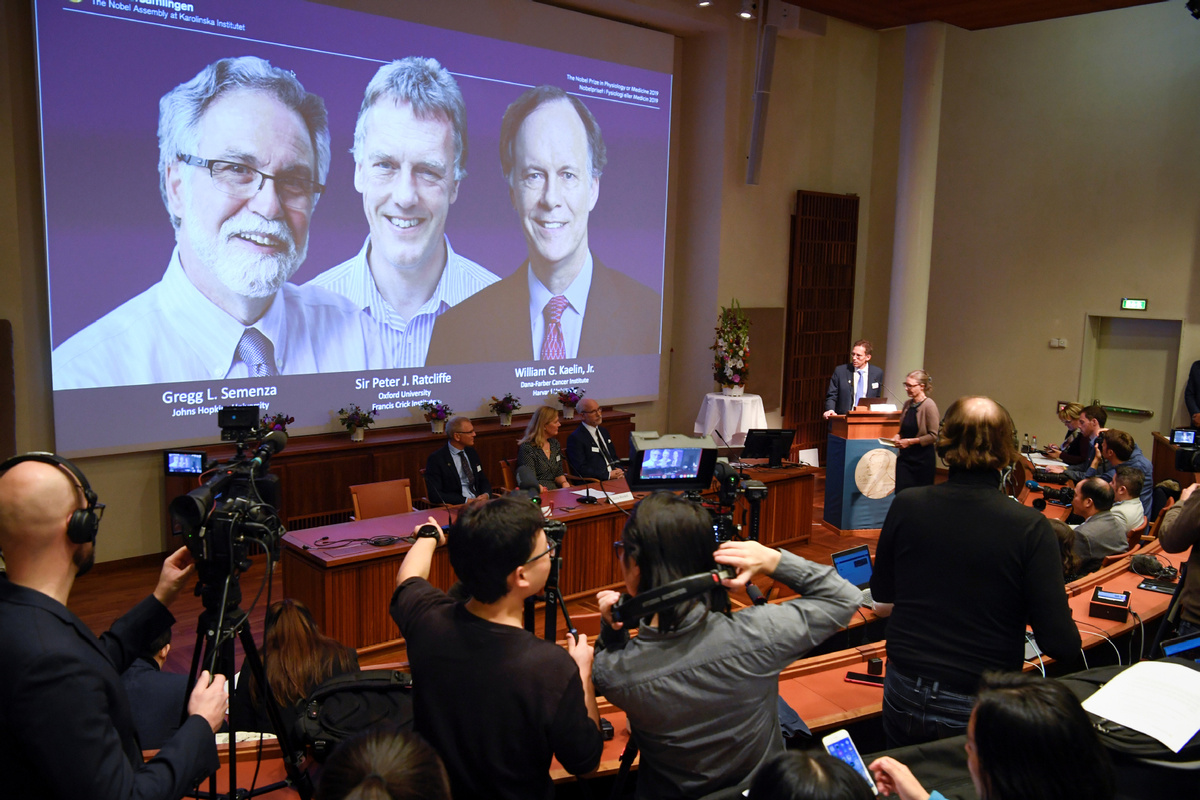3 get Nobel Medicine Prize for learning how cells sense oxygen


The discovery paves the way for new strategies to fight anemia and cancer
The 2019 Nobel Prize for research in physiology or medicine will be awarded to scientists Peter J. Ratcliffe of Britain and Americans William G. Kaelin and Gregg L. Semenza "for their discoveries of how cells sense and adapt to oxygen availability". The Nobel Assembly made the announcement on Monday. The prizes for physics, chemistry and literature will be announced later this week.
Ratcliffe is based at the Francis Crick Institute in London, while Kaelin and Semenza are based at Harvard Medical School and Johns Hopkins University, respectively.
The impact of the trio's discovery is wide-ranging, with the body's response to changing oxygen levels implicated in everything from exercise to fetal development.
It's also involved in a number of diseases. Patients with chronic renal failure, for example, produce less EPO (the hormone erythropoietin), and as a result often suffer from severe anemia.
In cancer, tumors use the oxygen-regulated system to trigger the development of new blood vesselsan area that is being investigated for new ways to tackle the disease.
In 2016, the trio won the Albert Lasker award for basic medical research. The Lasker awards are sometimes referred to as "Nobels of the United States", and previous winners often go on to win a Nobel Prize.
In a statement from the awarding body, Sweden's Nobel Assembly at Karolinska Institutet, explained that the "fundamental importance of oxygen has been understood for centuries, but how cells adapt to changes in levels of oxygen has long been unknown".
"The seminal discoveries by this year's Nobel Laureates revealed the mechanism for one of life's most essential adaptive processes. They established the basis for our understanding of how oxygen levels affect cellular metabolism and physiological function. Their discoveries have also paved the way for promising new strategies to fight anemia, cancer and many other diseases," it said.
It is known that oxygen sensing is central to a large number of diseases. Intense ongoing efforts in academic laboratories and pharmaceutical companies are now focused on developing drugs that can interfere with different disease states by either activating, or blocking, the oxygen-sensing machinery.
According to the Nobel Assembly, oxygen sensing allows cells to adapt their metabolism to low oxygen levels: For example, in muscles during intense exercise. Other examples of adaptive processes controlled by oxygen sensing include the generation of new blood vessels and the production of red blood cells.
"Thanks to the groundbreaking work of these Nobel Laureates, we know much more about how different oxygen levels regulate fundamental physiological processes," the statement said.
Since it was first established in 1901, the Nobel Prize in physiology or medicine has been awarded 109 times to 216 scientists.

































